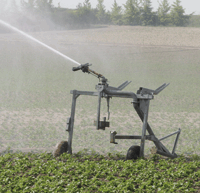Switching to electricity could save energy and cut irrigation costs

Using electricity rather than diesel to power irrigation pumps could cut energy bills in half.
Hose reels remain the most popular way of irrigating crops and are used on about 70% of the area, independent irrigation consultant Bill Basford told a recent UK Irrigation Association seminar, Pumping Money Down the Pipeline.
“But they have a high-pressure output – 5.5-10 bar – so require a lot of energy,” he added.
A typical set up using a 30kW motor with a pressure head of 120m, on a 72m spread pulling at 30m/hour would run up an energy bill of about £14/ha, he said. Using diesel would require a more powerful unit – even a reasonably efficient one would need to be about 45kW (60hp) to do the same job. As a result that would cost about £25.50/ha. “And the diesel system is not as easy to manage,” Mr Basford said. “You could easily be driving 1500 miles a season from field to pump and vice versa to operate it.”
Growers with rainguns should match pipework, controls and pumps to obtain the lowest energy input, he said. For example,pumping 30 litres/sec through a 100mm pipe used 4.4kW, while pumping the same volume through 150mm pipes slashed the energy needed to just 0.7kW.
Big savings could also be made by switching to alternative irrigation systems, which operated at lower pressures, Mr Basford said. Pumps for boom systems typically ran at 2-4 bar, and would use about 24kWh, about two-thirds the hose-reel’s consumption. Drip irrigation operated at just 0.7-1 bar and used the least amount of energy – a miserly 7.4kWh depending on pumping rates and layouts.
The high cost of these alternatives was a key reason why hose reels remained so popular. “But these sort of energy savings could go along way to paying to set up a system,” Mr Basford said. “Of course, there are many other aspects that limit adoption of raingun alternatives.”
Finally, ensuring soil infiltration rates were not exceeded, and adopting cultivation techniques to keep water where it was needed, as well as more obvious solutions like tie ridges, could all make irrigation much more efficient and reduce the number of passes needed – and therefore bills, Mr Basford said.

